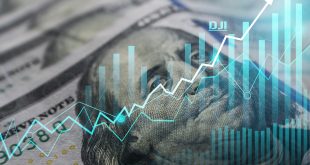Wall Street is off to another day in the red territory at the start of the shortened trading week as investors are grappling with earnings seasons and rising Treasury bond yields.
All three major indexes opened lower, with the Dow down 400 points, or 1.1%. The broader S&P 500 dropped 1%, and the Nasdaq Composite slipped 1.4%. The market was closed on Monday for Martin Luther King Jr. Day.
Interest rate talk could be the main reason behind stocks’ retreat while the yield on the 10-year tops 1.8% and the 2-year yield moved back over 1%.
Both those bonds’ yields have not been at similar levels since before the pandemic: For the 10-year it was January 2020 when it last yielded over 1.8%, and the 2-year hasn’t touched more than 1% since February 2020, according.
Wall Street has been under pressures too thanks to Fed tightening worries, the jump in rates and worries over slowing growth.
The Federal Reserve is rolling back its pandemic stimulus program and expects multiple interest rate hikes this year to rein in rampant inflation.
Wall Street predicts the first rate increase will occur at the central bank’s March meeting. That would mark exactly two years since the Fed slashed rates to near zero to support the economy through the pandemic.
Then there’s earnings season. As last week’s earnings reports revealed, the bottom line and guidance have been adversely impacted by rising expenses, inflation worries are everywhere.
As earnings season gets under way, investors were disappointed with JPMorgan Chase (JPM) results on Friday and Goldman Sachs (GS) results Tuesday morning. Both banks’ stocks fell at the open Tuesday, with JP Morgan down 2.3% and Goldman Sachs dropping 6.4%.
On top of all that, economic data this morning disappointed expectations as the New York Fed’s manufacturing index plummeted thirty-three points to -0.7. This abrupt turnaround came after eighteen months of growth.
“Manufacturing activity was little changed in New York State according to the January survey, suggesting that growth stalled after a period of significant expansion,” the NY Fed said.
The equity market weakness experienced thus far in 2022 is not unusual. In fact, history shows that stocks tend to sell off and correct after a 20+% gain in the preceding calendar year. And if the selloff doesn’t occur right away, it happens later on in the year. The implication for 2022 is that the current decline has further to fall.

 Noor Trends News, Technical Analysis, Educational Tools and Recommendations
Noor Trends News, Technical Analysis, Educational Tools and Recommendations




